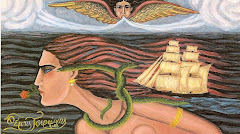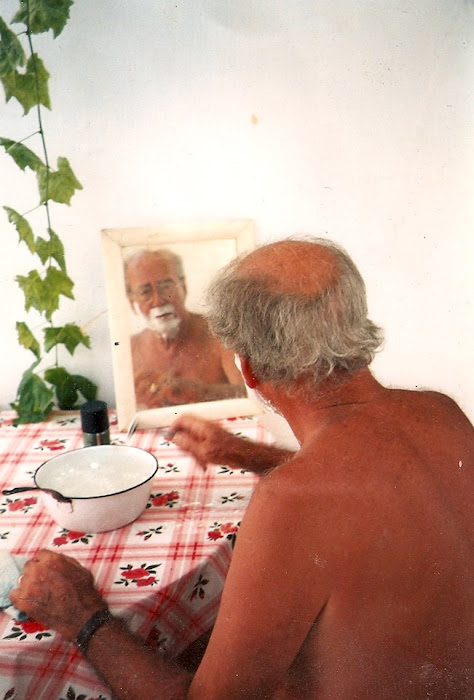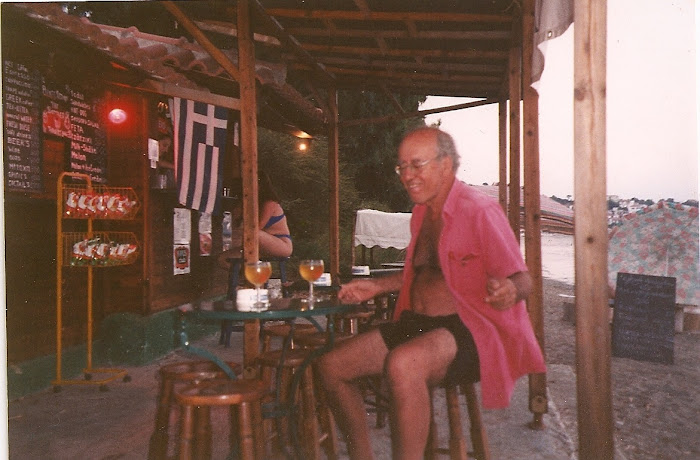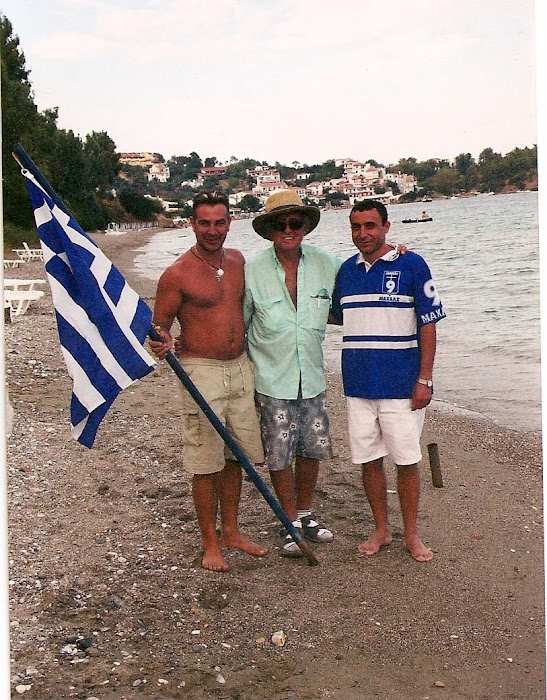I couldn't sleep, so I picked up a New Yorker magazine that had arrived shortly after the holidays and had somehow escaped my attention, and what a great surprise to find Kelefa Sanneh had written a nice long article about Will Oldham, aka Bonnie "Prince" Billy. I've linked it in, so if you click on the title of this post you can read it-enjoy!
This is a place to be to be, this is a place to be

Skopelos and Virgin
when first you see it
across the water,
rising round and new above the mountain.
Open your mouth and swallow
while youth holds its roundness near,
and you are running fearless in the dark.
Hold it inside, it is still warm
and you will need its light,
there, inside you.
Down the road of time, somewhere
after you’ve aged, traveled,
Explored, discovered.
And the dust around your doorway
has been pounded hard and smooth under your feet.
When you find yourself growing weary and bored,
when your eyes see only ruins,
and your heart is empty.
You may believe, in your exhaustion,
that this is truth, at last.
That the mystery has unraveled,
leaving no wilderness to explore or tame.
All secrets have been shared,
the frontier has dissolved.
Know then, with these thoughts,
you have been swallowed.
The warm belly of the beast
comforts with confining darkness
and lulls with rhythmic sounds
Murmuring to you,
Curl up and sleep,
just go to sleep.
Shake your head,
stretch your legs,
do not sleep now.
Remember what you know.
You swallowed the moon,
you hold it inside you.
Not as a magpie hoarding shiny things,
or wearing the moon for beauty
or bartering the moon for wealth.
You swallowed the moon for this moment.
When you will walk to the water’s edge,
open your mouth, release the moon
and let its light build you a pathway
across the wine dark sea.
©Skorda 2008

note
Saturday, January 31, 2009
Bonnie 'Prince' Billy - No Bad News
Trouble, more trouble can you get anymore
Slow bubble boiling on the bedroom floor
Lonely ain't lonely, someone calling at the door
Someone lovely and she's bringing bad news
She clenches and she cries and she lays on the stairs
Pounding on the earth and yanking at her hairs
And showing such fear at being found unawares
To be here and be bringing bad news
Well, something bad happens and a lot of people go
Bad themselves, that's how awful it is
Turning half the heart into something hard and dark
And she had to bring here this
Well, she's told, "Hold your buttons and look at the sky
Someone will fix things if you let your face dry
Keep your face near the earth and your heart beat high
And you may transcend the bad news"
Well, something bad happens and a lot of people go
Bad themselves, that's how awful it is
Turning half the heart into something hard and dark
And she had to bring here this
For all hammers and nails
For all leaves and winds
For all love ambitions
And enemies and friends
She shakes her face so fiercely that all her features go
She lays like a monkey unclothed in the snow
And her voice it decays and before it does she goes,
"I will never again deliver bad news"
Something bad happens and a lot of people go
Bad themselves, that's how awful it is
Turning half the heart into something hard and dark
And she had to bring here this
Mm, hey little bird – hey little bird
Thank you for not letting go of me when I let go of you
Hey little bird – hey little bird
Thank you for not letting go of me when I let go of you
(Hey little bird – hey little bird)
Thank you for not (letting go of me when I let go of you)
Tuesday, January 27, 2009
Saturday, January 17, 2009
a trip
I'm in the airport in Newark, filling up on cheese and crackers, free drinks. A three hour layover. Met up with my mother and sister here, we travel on together, heading south, first Florida, then beyond. I'm looking forward to the sun, the colors, especially the shades of blue.
Friday, January 16, 2009
beginnings: work in progress
- by Skorda
He was born on the bar of the Messogia Taverna.
George himself had no recollection of the event, of course, but as a child he had heard the story of his birth so many times, and with such vivid detail, that the stories became his own. They mingled in his mind with other childhood memories, and eventually he became thoroughly convinced that he could remember the exact moment of his own birth.
George carried the memories of his early life in Greece as a secret treasure, tucked tightly into a small corner of his mind. The memories of his birth were the most precious, for these belonged to him alone. In his darkest moments, when he felt isolated from the world around him, and very far from home, when he could feel his will for living buckling under the painful weight of regret loneliness and fear, he would ease these memories out from the dark corners of his mind and find comfort. Searching for meaning in his existence, as if to somehow affirm his own human value, he would relive each step of his journey from nothingness to being.
His earliest memory was that of surprise, as he felt his infant form move from the womb, sliding from wet to dry, from warm to cold, and from calm to chaos at that first shocking moment when he was slapped into awareness. He savored the memory of that moment when he opened his eyes for the first time and found himself looking directly into his mother's weary but beautiful face, with boundless love flowing from her to him. His attention would then be drawn to the loving smiles of the five other women surrounding his newborn self, his childhood "aunties", who were wrapping him up in a warm towel and blanketing him with effusive welcomes into the world. George's first earthly breaths drew in the stink of wine and grease and blood and piss. These odors, intertwined as they were with that initial moment of bliss and unconditional love, would forever bring him comfort rather than revulsion. In the course of his life this would turn out to be a mixed blessing.
His mother had been a broad boned seventeen year old farm girl, poor and illiterate, like nearly all of the other women on the island.
But unlike the other young women, Maria Andoniou had been blessed with two great gifts, she possessed both a divine face and an extraordinary voice.
Maria's face had regular features and a serene expression. On any other island, or perhaps in all of Greece, her pleasantly normal looks would draw little notice. Here things were a bit different. On this island, her lovely countenance caused the local people to turn their heads, or to gasp in shock. Few islanders could look into her face. If one inadvertently caught sight of her, the immediate response was to begin making the sign of the cross, and then, just to be safe, to spit three times or to surreptitiously move towards a piece of wood and give three gentle knocks. It was a ghastly reality, a complete disgrace and yet it was the visible truth, this poor peasant girl's face was the embodiment of the island's sacred icon, the Panaghia Kounistria,
Maria never considered her looks as a blessing. As a child she was teased, taunted or simply ignored. She would run crying to her mother. "They hate me", she'd sob, "they will not play with me. I have no friends, mama." It was true, none of the youngsters wanted to share secrets with the face they had seen in church being kissed by the priest.
As she came into womanhood Maria's looks grew ever more lovely, but her troubles did not lessen. Like every other young girl on the island, she spent many hours waiting anxiously for the day when her parents would announce that they had made for her the perfect romantic match. The high point of every young girl's life was her wedding, but as time passed and no suitors arrived, Maria's father was growing desperate. Despite his daughter's beauty and talents, he found it difficult to negotiate a suitable marriage. Few young men want to be reminded of religion every time they climbed into their marital bed.
With the war, Maria's marital options grew even slimmer. Eventually, her father succeeded in making a deal with Yiannis Grammata,. Yianni was forty-seven, too old to be called to the war. He had some goats he tended, and a small boat he used for fishing. He was not very industrious, but he got by. He’d considered marriage a few times, but the thought of giving up his freedom made him tremble. Yianni was willing to make a deal for Maria. "She's strong, she's sturdy, and I've seen that she is a hard worker. I will take her, but we must also have the farm." The farm consisted of a several acres of olive trees and pastures for goats and sheep. It had been in Maria's family for several generations. Now it was to be given as prika, and Maria would live there as a married woman. Maria and Yianni had been married less than a year when George was born.
Maria's second gift was a near operatic voice. When she opened her mouth and began to sing, villagers would stop what they were doing, the hairs on the back of their necks would lift and they would find themselves transfixed, drawn by pure sound into a world where human experience and emotion were limitless. Nick, the ancient, nearly blind man who spent his days doing nothing more than sipping coffee and running worry beads through his arthritic fingers, was so moved by the sweet clear tones of Maria's singing voice that he once jumped to his feet and began yelling over and over in a loud and passionate voice, "Please, yes, let me, please!".
That evening at the Messogia, Maria had been halfway through a heart wrenching rendition through "Sinefiasmeni Kiriaki" when her water broke.
There were not many men in attendance at the taverna that evening. The war had broken down many of the traditions and taboos that separated the sexes, but most men still found themselves uncomfortable in the presence of a heavily pregnant young woman, especially one with the face of the Virgin Mary. The few men that had witnessed the imminent birth soon fled, leaving the women to tend to the mother and her ordeal.
The door closed behind the exiting men, and Maria began to sob.
The village five women murmured soothing phrases as they helped the frightened girl onto the broad wooden planks of the table, the very place where the group had been gathered just minutes before. Maria's sobbing continued, escalating into moans and screams. The table threatened to buckle under her heaving form, and the women, realizing that only the bar would be strong enough to support her, slipped their fingers under her back and moved her up onto the wide wooden planks of the bar. Maria gazed into the flickering reflections of candlelight as it bounced off of the glasses on the shelf above the bar. She gathered her strength and pushed. "Please God, let my baby be a boy", she prayed as the the strong contractive pain tore into her , "this world holds little joy for us women." And then she was looking into the red and wrinkled face of her child, her prayers answered.
©Skorda 2009
Thursday, January 15, 2009
A Thousand Pieces
This evening I was reminded of the time I spent in Denmark, how much that wonderful country means to me, and the special place it holds in my heart. I send my warmest thoughts out to the Danish people!
I love this song! Thank you, Henning.
Tusind Stykker
-Anne Linnet
Man sir' at over skyerne er himlen altid blå
Det kan være svært at forstå når man ikk' kan se den
Og man sir' at efter stormens pisken, kommer solen frem
Men det hjælper sjældent dem der er blevet våde
For når vennerne forsvinder og når livet er betrængt
Ser man alt med ganske andre øjne
Man øver sig og bliver langsomt bedre til at se
og skelne mellem sandheder og løgne
Man siger jo at det der sker er altid godt for noget
Troen har vi fået for at bruge den
Man sir' så meget, men ved så lidt når angsten den har fat
Sjælen mærker illusionen briste
For når vennerne forsvinder og når livet er betrængt
Ser man alt med ganske andre øjne
Man øver sig og bliver langsomt bedre til at se
og skelne mellem sandheder og løgne
Alting kan gå itu
Et hjerte kan gå i tusind stykker
Find More lyrics at www.sweetslyrics.com
Kaldte du mig for ven engang
Så er jeg her nok endnu
Mmmmmm
Ja, alting kan gå itu
Et hjerte kan gå i tusind stykker
Kaldte du mig for ven engang
Så er jeg her nok endnu
For når vennerne forsvinder og når livet er betrængt
Ser man alt med ganske andre øjne
Man øver sig og bliver langsomt bedre til at se
og skelne mellem sandheder og løgne
Alting kan gå itu
Et hjerte kan gå i tusind stykker
Kaldte du mig for ven engang
Så er jeg her nok endnu
Alting kan gå itu
Et hjerte kan gå i tusind stykker
Kaldte du mig for ven engang
Så er jeg her nok endnu
Kaldte du mig for ven engang
Så er jeg her nok endnu
Kaldte du mig for ven engang
Så er jeg her nok endnu
a passage from what I am working on
In the nearly five years since he had returned to the island, George hadn’t yet “made the adjustment”. Most men of the village wrote him off as just one more loser expat who’d come home to collect his pension checks and squander his last years in an alcoholic haze. Women, and those very few men blessed with a generosity of spirit, looked upon him with pity,
Just about everyone in the village knew who he was. He wore the same clothes day after day, a striped polo shirt and gray gym shorts. it was obvious that he rarely bathed or shaved His graying whiskers were curled and matted under his chin, and his body gave off the sharp acrid odor of alcohol passed through urine.
Each evening at twilight he would George stumble through the undergrowth of the eucalyptus grove onto the dirt that led away from the beach through the tourist center and on into town. With uncertain gait he would make his way along the narrow cobblestone alleys through the old quarter, past the old women in black who gathered on the marble front stoops of the houses by the church plaza for a few precious moments of rest and gossip before the gathering darkness forced them off the street and back into their homes. The custom of women was not to speak to this strange solitary man as he passed, but as George approached, the women invariably would pause their conversation, and look up. One or two of the women would give a slight nod of acknowledgement, meeting George’s eyes as a caged creature night seek the gaze of another trapped in similar but unknowable circumstances. Once he had passed they would click their tongues and whisper amongst themselves, passing on rumors of the terrible tragedies this poor, poor man had endured. Having known the depths of sorrow in their own lives, they did not judge him. Perhaps he needed a good woman, or perhaps he was beyond salvation from anyone but the Lord.
On the other side of the plaza, men gathered at the cafeneio “Nea Kosmos”’ to drink strong sweet coffee or the raw spirit known as tsipiro,. As George passed by the men barely lifted their eyes from their backgammon boards. There were no acknowledging nods no smiles, just silence and the steady clicking sound of worry beads, the rhythm escalating as George drew near, as if each set of beads were performing a rite of exorcism against whatever it was that had broken this man.
Wednesday, January 14, 2009
Sunday, January 11, 2009
Thursday, January 1, 2009
January Greek Name Days
January 1 - New Year's Day - Agios Basileios, Vassilis (Basil)
January 6 - Theofania, Theofanis, Fotis, Fanis, Fotini
January 7 - Synaksi Ioannos, Ioannis, Yannis, Giannis (John)
January 8 - Dominikis
January 10 - Grigorios Nussis
January 11 - Theodosios, Thodoris (Theodore)
January 17 - Antonios, Antonia, Antonis (Anthony)
January 18 - Athanasios & Kurillos, Thanassis
January 19 - Makarios
January 20 - Eythimios, Thimios
January 21 - Maximos, Massimos/ Neofytos / Agnis (Agnes)
January 22 - Anastasios / Timothetos, Tassos
January 23 - Agathagellos
January 24 - Xenis, Xeni
January 25 - Grigorios Theologos / Margarita, Grigoris, Grigorios (Gregory)
January 26 - Xenofontos
January 29 - Ignatios
January 30 - Trion Ierarxon
January 31 - Kyros & Ioannos Aaron
ERASE FETISH












